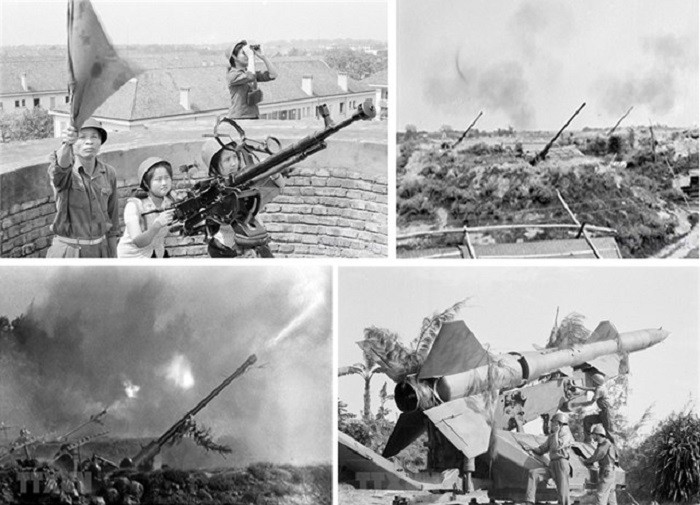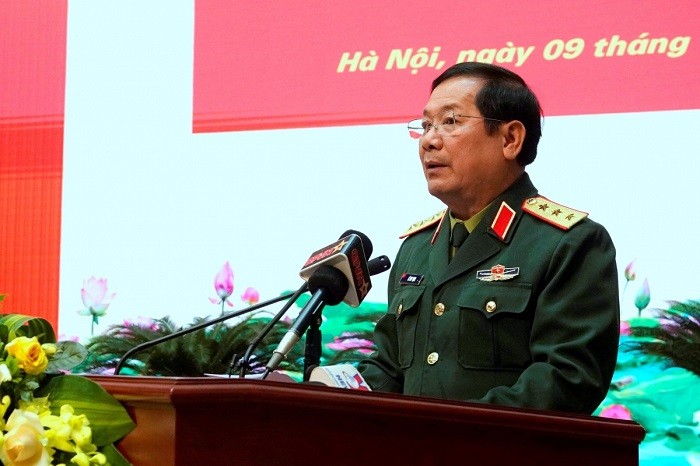(VOVWORLD) - 50 years ago, on December 18, 1972, the US military launched a strategic air raid deploying mostly B-52 strategic bombers to attack Hanoi, Hai Phong, and some provinces and cities in northern Vietnam. Operation Linebacker II attempted to win an overwhelming military victory to turn the Paris negotiation toward the US’s favor. With a determination to fight and win, the Vietnamese army and people defeated the air raid, creating the “Hanoi-Dien Bien Phu in the air” victory that shocked the world.
 1972 Hanoi-Dien Bien Phu victory in the air – A victory of Vietnamese strength and intellectuality 1972 Hanoi-Dien Bien Phu victory in the air – A victory of Vietnamese strength and intellectuality |
To prepare for Linebacker II, the US military mobilized a huge number of ammunitions including 193 B-52s fighters, nearly 50% of the B-52 aircraft in the US army's payroll, 48 F-111A combat aircrafts and 999 fighters of all kinds deployed in Thailand, southern Vietnam and on 6 aircraft carriers in the East Sea.
In addition, a number of KC-135 refueling aircrafts and other support aircrafts were also mobilized. The US increased warships in the Gulf of Tonkin from 18 to 66 or 60% of the combat ships and amphibious ships of the Fleet 7.
Defeating the US’s strategic air raids
During the 12 days and nights of Operation Linebacker II (December 18-29, 1972), the US military mobilized B-52 strategic aircraft 740 times and tactical aircraft more than 1,000 times, using the jamming electronic weapons, dropping more than 36,000 tons of bombs on economic and military targets in Hanoi, Hai Phong, Thai Nguyen and some other places. In which, B-52 bombers carpeted on hospitals and densely populated areas in Hanoi, such as Bach Mai hospital (on the night of December 21) and Kham Thien street (on the night of December 26) killing and injuring 500 people and destroying nearly 2,000 houses.
With active preparation and strong determination, Vietnam’s air defense force and air force, the Vietnamese army and people of Hanoi, Hai Phong and the northern provinces and cities, shot down 81 aircrafts, including 34 B-52s and 5 F-111s, and captured many American pilots. This is the first time in history that such a large number of B-52 strategic bombers, which were dubbed the "Flying Fortress" of the US military, was shot down.
 Senior Lieutenant General Le Huy Vinh, Deputy Minister of National Defense Senior Lieutenant General Le Huy Vinh, Deputy Minister of National Defense |
Senior Lieutenant General Le Huy Vinh, Deputy Minister of National Defense, said; “The 1972 Hanoi-Hai Phong air defense campaign was the first in the world that shot down such a large number of B-52s, inflicting the hardest hit to the US Air Force in history, defeating the US’s attempt to win the negotiation and forcing the US to sign the Paris Peace Accords (January 1973) on ending the war and restoring peace in Vietnam. The "Hanoi-Dien Bien Phu in the air” victory created favorable conditions and strategic opportunities for the entire Party, people and army to end the resistance war against the US.”
General George Etter, Deputy Commander of the US Strategic Air Force, admitted in US Air Forces Magazine on December 30, 1972 that the loss of the B-52 strategic aircraft and its crew members was extremely heavy and a big shock to the Pentagon planners. US President Richard Nixon wrote in his memoirs that he was not worried about waves of protests and severe criticism at home and around the world, but the extent of the damage because the loss of B-52s was so heavy.
Victory of Vietnamese courage, intellectuality and strength
At a national workshop themed "1972 Hanoi-Dien Bien Phu in the air victory - Vietnam’s strength and the stature of the times" in Hanoi last week, scholars and researchers continued to analyze, clarify and affirm the stature of the era and great historical significance of the 1972 Hanoi-Dien Bien Phu in the air victory.
They said the victory was of strategic importance creating a turning point for the Vietnamese people’s resistance war against the US. They said it was manifestation of Vietnam’s courage, intellect, and strength. It embraces a profound imprint of the times, demonstrates the invincible power of the Vietnamese and encouraged progressive people around the world.
Dr. Nguyen Hoang Nhien, Director of the Institute of Military History of Vietnam, emphasized: "The Hanoi-Dien Bien Phu in the air victory is the victory of a heroic nation, determined to fight with the spirit of ‘Nothing is more precious than independence and freedom’ and uphold the strength of Vietnam’s people's war in the Ho Chi Minh era. It is also the victory of a just war with the effective help of international friends and the support of progressive people all over the world, including the American people. It is a victory of progressive mankind and embraces the stature of the times. It encouraged movements for independence, freedom and democracy around the world".
50 years have gone by, but the glorious echo of the "Hanoi-Dien Bien Phu in the air victory" still resonates as a brilliant milestone in the history of the Vietnamese nation. The victory reflects the bravery, intelligence, strategic vision of the Vietnamese Party and the strength of the Vietnam People's War in the Ho Chi Minh era, in which the Vietnam People’s Army is the core. The stature, meaning, and valuable lessons learned from the victory are still valid today in Vietnam’s national construction and defense.